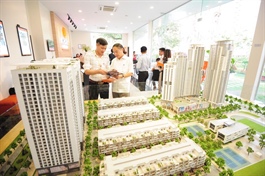Attraction some way off for social housing
Attraction some way off for social housing
The lack of affordable social housing has raised whether foreign developers should be allowed to invest in this segment in Vietnam.

According to the Department of Housing and Real Estate Market Management under the Ministry of Construction, more than 220 social housing projects with 188,000 apartments over 9.4 million square metres have been in the pipeline in Vietnam, and 142,000 of those are completed. That figure, however, is only around one-third of the target set out in Vietnam’s National Housing Development Strategy to 2020.
Government leaders have recently urged local authorities to smooth the way for foreign parties to invest, photo Dung Minh
David Jackson, CEO of Colliers Vietnam, said that international institutions and foreign investors were not yet allowed to take part in the development of social housing, which could be part of the reason for the low figures. However, if new laws and regulations could enable their participation, affordable housing or social housing could become more appealing.
“In many markets, there is a huge need for affordable social housing so investors and/or developers have deep occupier demand. This type of asset tends to create a stable income stream, with high occupancy rates if well operated,” said Jackson.
“This means in terms of asset class, affordable housing and/or social housing provide investors with certainty, which is in tune with their defensive strategies in an increasingly uncertain global market.”
However, Jackson said, there are currently many hurdles which scare off potential investors in this area.
“These include scalability as well as legal and financial complexities, not to mention the costs for acquiring developmental sites in increasingly constrained urban areas. There is also low infrastructure connectivity, and tough competition where high-end and luxury developers can outbid low-cost providers,” he said.
“Therefore, the designing of policies needs to take into account these factors to help make it more conducive for foreign investors to look.”
According to Hoang Van Dao, a lawyer from the Vietnam Bar Association, under the Law on Housing 2014, foreign enterprises in Vietnam are allowed to buy individual houses, but there is no regulation on buying social housing.
“To let foreign investors participate in social housing development, specific mechanisms need to be mapped out, and legal documents will also have to be amended,” said Dao.
Nguyen Manh Ha, vice chairman of the Vietnam Real Estate Association, said that the government should have stronger policies. To increase supply, the government needs to re-plan areas to build a worker housing model.
“It is possible to develop housing for workers according to the condotel model, aiding investors with limited financial resources. In addition to income from monthly rentals, primary investors also benefit from the price increase in real estate,” Ha said.
The reason affordable housing has not been developed is because policies in this area do not interest investors, and profit from affordable housing projects is low.
As a developer of social housing, Truong Anh Tuan, board chairman at Hoang Quan Group, said the focus on social housing had made the company little profit.
“Recently, land fever is everywhere, and small businesses can immediately make 100 per cent profit on one project. Meanwhile, we still only have profit of about 10 per cent,” Tuan said.
Dang Hung Vo, former Deputy Minister of Natural Resources and Environment, said that while only Vietnamese enterprises were allowed to implement social housing projects, the gap between domestic and foreign enterprises needed to narrow.
“Foreign businesses that want to develop social housing with enough capital and experience to develop social housing could be of great benefit,” Vo said.
To open this segment to foreign investors, Jackson from Colliers said completing legal provisions, which allow the participation of foreign investors in the segment, was key.
“As for investors with long-term views and commitments to the Vietnam real estate market, the costs of non-compliance with local laws and regulations are too high to risk. For them, the growth potentials are great, but the most important fundamentals must be laid out before any further involvement,” he said.
At a conference on social housing development in Hanoi last August, Prime Minister Pham Minh Chinh emphasised policies for the development of social housing and housing had not met practical needs.
PM Chinh emphasised that local authorities must continue to improve mechanisms and policies for foreign investors to participate more actively and effectively in the development of social housing for workers and employees.
“The implementation of preferential policies for social housing must go through many steps, so the time to implement investment procedures is prolonged, preferential policies for investors of social housing projects, workers’ housing are not attractive enough to encourage investors,” said the prime minister.
Last month, the government proposed a credit package of around $4.6 billion to fund social housing and worker home projects. Half will be given to property developers as incentive loans, while the rest will go to homebuyers.
Four state-owned banks also agreed last month to set aside a credit package of $5 billion for the development of social housing and workers’ housing projects, but further details are yet forthcoming.





















